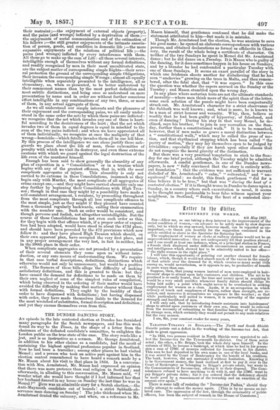rein ta tkt Ruin.
EMPLOYMENT Dili WOMEN. 4th Hay 1857.
Sin—Allow me, as one taking a deep interest in the improvement of the social condition of women,—an advance to be safely made by slow degrees only, but in which no step onward, however small, can be regarded as unimportaut,—to thank you heartily for the suggestion contained in the article entitled as above in the Spectator for Saturday last.
The employment of women as clerks at railway stations would not be an unprecedented innovation : they not unfrequently fill that position abroad ; and I can recall at least one instance, when, at a principal station in France, a female clerk displayed under difficult circumstances an amount of zeal and intelligence which showed her to be admirably suited to her office-."the right woman in the right place."
I will take this opportunity of pointing out another channel for female labour, which, though it would not absorb much of the excess in the supply of that article over the demand for it, which creates so many social evils among us, would nevertheless, as it appears to me, be productive of benefit in more ways than one.
Suppose, then, that young women instead of men were employed in hairdressers' shops to attend upon lady customers and children. The art to be practised is so easily learnt, that the time and money spent in acquiring it would be a very small sacrifice whenever family duties should oblige its being laid aside ; a point which ought never to be overlooked in seeking employment for women as a class. Again, it is an occupation in which delicacy of touch and suppleness of fingers, rather than strength, are required, and moreover it necessitates no exposure to the weather; BO that while particularly well suited to women, it is unworthy of the superior strength and hardihood of men.
I will only add, that by introducing female assistants into hairdressers' shops to attend upon customers of their own sex, these would be relieved from the necessity of -submitting to that familiar handling of their tresses by strange men, which certainly they would not permit to any male relatives but the very nearest.
I am, Sir, your constant reader for many years, X.
• TAXATION-TYRANNY Is ENGLAND.—Tho North and Soutk Shields Gazette points out a defect in the working of the Income-tax Act, that leads to great oppression.
"In 1864, two persons resident in North Shields were appointed to collect the Income-tax for the Tynemouth In-district. One of them never acted ; the other, a Mr. Briggs, took the whole duty upon himself. In the autumn of 1855, he became a bankrupt, at which time he had in his possession a sum of 1700/. of moneys collected for Income-tax in his district. This sum be had deposited in his own name in one of the local banks, and it was seized by the Court of Bankruptcy for the benefit of his creditors. The bank, however, did not surrender it without hesitation. Knowing it to be Government money, the bank declined at first to pay it over to the Court of Bankruptcy as belonging to Briggs's private estate, but wrote to the Commissioners of Income-tax, offering it to their disposal. The Commissioners refused to have anything to do with it, and the 17001. went to pay Briggs's private debts; but it was ordered that the deficiency should be made good by a reassessment of the township and an exaction of the amount over again."
There is some talk of resisting the "Income-tax Pashas," should they really attempt to collect the money again. [This is by no means an isolated ease. The oppression of the law, through the criminality of public officers, has been the subject of remark in the House of Commons.]


























 Previous page
Previous page